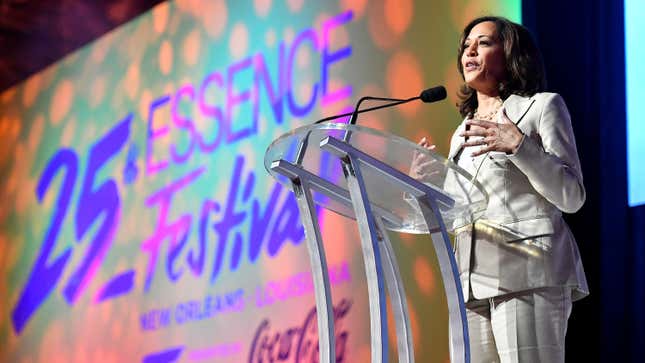
Joining what seems like every black woman in America at Essence Fest, senator and presidential hopeful Kamala Harris unveiled a $100 billion plan to increase black homeownership that, if implemented, could serve as a major step toward closing the racial wealth gap or at least pay two or three months rent on a modest one-bedroom studio in Manhattan.
Harris’ plan would offer down-payment and closing cost assistance of up to $25,000 to renters and families living in redlined neighborhoods. The policy proposal also requires credit reporting agencies to include payment histories for rent, phone and utility payments, which would address credit problems for people who don’t have auto loans or credit card accounts. The Harris campaign calculates that this plan could help four million borrowers own homes and increase the median wealth of black families by $32,000, the New York Times reports.
“A typical black family has just $10 of wealth for every $100 held by a white family,” Harris said in New Orleans on Saturday, according to Politico. “So we must right that wrong and, after generations of discrimination, give black families a real shot at homeownership—historically one of the most powerful drivers of wealth in our country.”
Indeed, citing information from the Federal Reserve, the National Association of Homebuilders called homeownership the “primary driver of U.S. wealth.” But while the percentage of whites, Asians and Hispanics who own homes continues to rise, the black homeownership rate has fallen to an all-time low after decades of gains.
Harris’ plan is one of many proposals by Democratic presidential candidates to address the racial wealth gap. The median wealth for a white family is 41 times the median wealth of a black family. And while a black family is 20 times more likely to be in debt than to have a million dollars in assets, the chances of a white family having a million dollars in assets is exactly the same as a white family having zero or negative wealth according to the Institute for Policy Studies.
Aside from being paid less than whites who have the same education and experience, mortgage lenders turn away black borrowers twice as often as white borrowers and have devalued property in black neighborhoods to the tune of $156 billion dollars, according to researchers at the Brookings Institute.

